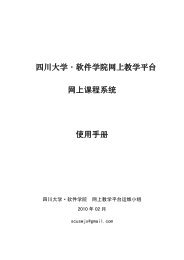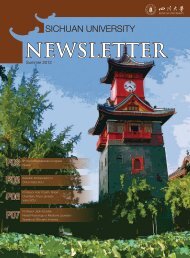Reflexive inquiry in organizational research: Questions and ...
Reflexive inquiry in organizational research: Questions and ...
Reflexive inquiry in organizational research: Questions and ...
Create successful ePaper yourself
Turn your PDF publications into a flip-book with our unique Google optimized e-Paper software.
998<br />
Human Relations 56(8)<br />
systems, or is the organization as a system just our theoretical representation<br />
The process of reflexive <strong><strong>in</strong>quiry</strong> attempts to address this representational<br />
paradox by claim<strong>in</strong>g to be <strong>in</strong>ventive – constructions rooted <strong>in</strong> the historical,<br />
social, l<strong>in</strong>guistic <strong>and</strong> <strong>in</strong>stitutional practices of <strong>research</strong> participants. So, can<br />
we construct grounded <strong>and</strong> thoughtful reflexive accounts that have some<br />
mean<strong>in</strong>g for participants <strong>and</strong> readers, are taken seriously, yet avoid both the<br />
certa<strong>in</strong>ty/universality implicit <strong>in</strong> conventional theoriz<strong>in</strong>g <strong>and</strong> the egotistical<br />
nature of solipsistic navel gaz<strong>in</strong>g Latour (1988) identifies three paradoxes<br />
relevant to the construction of explanations. I add my own <strong>in</strong>terpretations:<br />
How to be here <strong>and</strong> there (<strong>in</strong> the manager’s sett<strong>in</strong>g/experience/<br />
language/emotions <strong>and</strong> the academic’s sett<strong>in</strong>g/experience/language/<br />
emotions)<br />
How to be here, there <strong>and</strong> <strong>in</strong> between (how to span the boundaries between<br />
those worlds, between theory <strong>and</strong> practice, between different language<br />
games, to develop accounts plausible to both How can I become<br />
‘<strong>in</strong>volved’, yet record ‘data’ Can I <strong>in</strong>terpret, expla<strong>in</strong>, just present<br />
dialogue as collaborative sense mak<strong>in</strong>g <strong>in</strong> the moment, draw<br />
conclusions . . .)<br />
How to avoid be<strong>in</strong>g believed too much (this is the absolute truth) or too little<br />
(this is too trivial, local, convoluted . . . to be conv<strong>in</strong>c<strong>in</strong>g)<br />
Radically reflexive <strong><strong>in</strong>quiry</strong> imag<strong>in</strong>es local narratives based on the<br />
criteria of know how, know<strong>in</strong>g how to live, know<strong>in</strong>g how to listen (Lyotard,<br />
1984) – <strong>in</strong> which mean<strong>in</strong>g is embedded <strong>in</strong> the active subjectivity of participants<br />
<strong>and</strong> the communities with<strong>in</strong> which we live <strong>and</strong> work. A number of<br />
reflexive studies focus on fictionaliz<strong>in</strong>g accounts by us<strong>in</strong>g a variety of textual<br />
strategies such as irony (Ashmore, 1989), deconstruction (Mart<strong>in</strong>, 1990), or<br />
second voice (P<strong>in</strong>ch & P<strong>in</strong>ch, 1988). From a constructionist perspective,<br />
Weick (1998) suggests theoriz<strong>in</strong>g, or reflexive <strong>in</strong>terpretation, is ak<strong>in</strong> to<br />
‘essay<strong>in</strong>g’ ongo<strong>in</strong>g, <strong>in</strong>complete performances <strong>and</strong> rehearsals <strong>in</strong> which<br />
<strong>research</strong> participants work through possibilities. In his view, essay<strong>in</strong>g br<strong>in</strong>gs<br />
us closer to lived experience than preconceived theoretical constructs.<br />
We can reveal the <strong>in</strong>dexical nature of our <strong>research</strong> conversations by<br />
highlight<strong>in</strong>g emerg<strong>in</strong>g practical theories (Shotter, 1993), taken-for-granted<br />
ways of shap<strong>in</strong>g, order<strong>in</strong>g, <strong>and</strong> account<strong>in</strong>g for our experiences, of relat<strong>in</strong>g<br />
with others, of mak<strong>in</strong>g connections <strong>in</strong> our talk-entw<strong>in</strong>ed activities. These<br />
‘theories’ may be seen as a complex weave of explicit knowledge, embodied<br />
responses, <strong>and</strong> tacit know<strong>in</strong>g – a contextualized imag<strong>in</strong><strong>in</strong>g, sens<strong>in</strong>g<br />
<strong>and</strong> connect<strong>in</strong>g occurr<strong>in</strong>g <strong>in</strong> subjectal space (Kristeva, 1984) as <strong>research</strong>


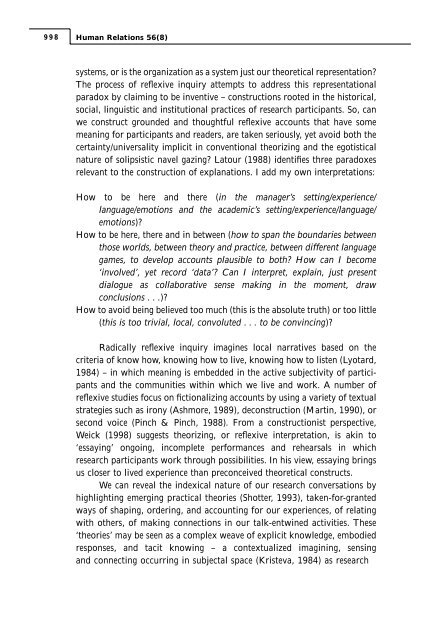
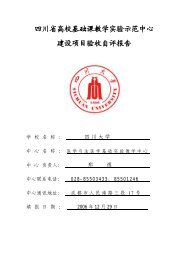
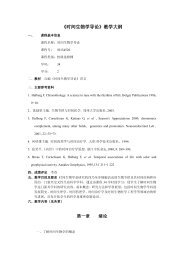
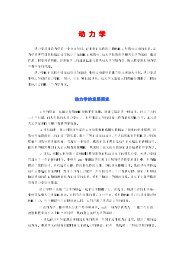
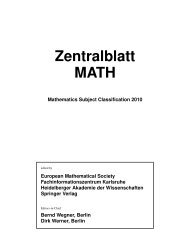
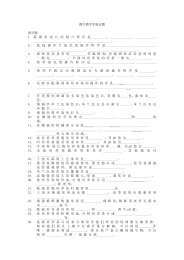
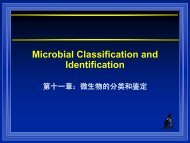
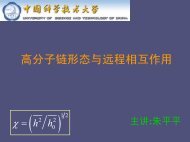



![第10 ç« æ¢ç弯æ²åºåMPa 30 MPa 36 kN/m 5.4][ = q = ][q](https://img.yumpu.com/29939822/1/184x260/c10-c-aeca-1-4-aeaampa-30-mpa-36-kn-m-54-q-q.jpg?quality=85)

